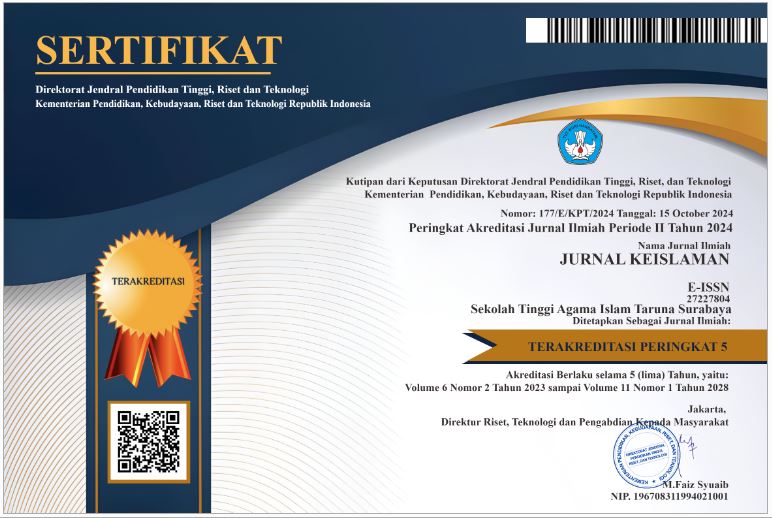Relevansi Filsafat Dalam Pembentukan Paradigma Pendidikan Modern
DOI:
https://doi.org/10.54298/jk.v8i1.382Keywords:
Philosophy of Education, Modern Education Paradigm, School of Philosophy, Education Policy, Innovative LearningAbstract
Through the study of philosophy, education not only functions as a means of transferring knowledge, but also as a vehicle for character building, critical thinking, and social awareness of students. This research uses a qualitative approach with a library research method, which aims to analyze the implications of philosophy for modern education. Data were obtained from various sources of academic literature, including books, scientific journals, and education policy documents. The data analysis technique was conducted through content analysis, by examining various philosophical concepts and their application in the contemporary education system. The results show that philosophical thinking contributes to shaping an adaptive curriculum, innovative learning methods, and the role of teachers as facilitators in the educational process. In addition, philosophy also plays a role in designing educational policies that are responsive to social and technological changes. By understanding the relevance of philosophy in education, it is hoped that the modern education system can produce individuals who are not only academically competent, but also have high moral, social and ethical awareness. Therefore, the integration of philosophical thinking in education needs to be continuously developed in order to create a learning system that is more holistic, innovative, and in accordance with the needs of the times.
Downloads
References
Abidin, Z. (1992). Eksistensialisme. Jurnal Filsafat, 1(1), 33–49.
Cholid, N. (2018). Kontribusi Filsafat Pragmatisme Terhadap Pendidikan. Magistra: Media Pengembangan Ilmu Pendidikan Dasar Dan Keislaman, 4(1), 51–66.
Fransiska, J., Dumiyati, D., Mariam, P., Hikmah, N., & Haris, M. (2023). Education Management in the Independent Curriculum in Elementary Schools. Al-Fikrah: Jurnal Manajemen Pendidikan, 11(1), 78. https://doi.org/10.31958/jaf.v11i1.8696.
Hardjo, R. M. (n.d.). Filsafat Ilmu Pendidikan. PT Remaja Rosdakarya.
Haris, M. (2015). PENDIDIKAN ISLAM DALAM PERSPEKTIF PROF. HM ARIFIN. Jurnal Ummul Qura Vol VI, 1.
Haris, M. (2019). Manajemen lembaga pendidikan Islam dalam menghadapi revolusi industri 4.0. Mudir: Jurnal Manajemen Pendidikan, 1(1), 33-41.
Haris, M. (2023). Local Content Curriculum Management at MA Al Asyhar Bungah Gresik. Mudir: Jurnal Manajemen Pendidikan, 5(2), 498-503. https://doi.org/10.55352/mudir.v5i2.765
Haris, M. (2023). Local Content Curriculum Management at MA Al Asyhar Bungah Gresik. Mudir: Jurnal Manajemen Pendidikan, 5(2), 498-503. https://doi.org/10.55352/mudir.v5i2.765
Haris, M., & Hidayatul Mufidah. (2025). Implementation of Civic Education in Increasing Religious Tolerance in Elementary Schools in the 21st Century. Athena: Journal of Social, Culture and Society, 3(1), 468–475. https://doi.org/10.58905/athena.v3i1.388
Haryanto, S. (2024). Relevansi Dimensi Spiritual Manusia Terhadap Implementasi Pendidikan Karakter. Jurnal Keislaman, 7(1), 57–65. https://doi.org/10.54298/jk.v7i1.238
Ismaraidha, I., Harahap, M. Y., & Hannum, L. (2024). Pendidikan Karakter Religius Melalui Budaya Literasi Al-Qur’an Di Madrasah Aliyah Swasta Amaliyah Sunggal. Jurnal Keislaman, 7(2), 249–362. https://doi.org/10.54298/jk.v7i2.264
Jenilan, J. (2018). Filsafat Pendidikan. EL-AFKAR: Jurnal Pemikiran Keislaman Dan Tafsir Hadis, 7(1), 69–74.
Junihot Simanjuntak. (2019). Filsafat Pendidikan dan Metodologi Pendidikan Kristen (Issue February). Andi Offset.
Legi, H., Damanik, D., & Giban, Y. (2023). Transforming Education Through Technological Innovation In The Face Of The Era Of Society 5.0. Educenter: Jurnal Ilmiah Pendidikan, 2(2).
Legi, H., Giban, Y., & Hermanugerah, P. (2022). Virtual Reality Education In Era 5.0. Journal Research of Social, Science, Economics, and Management, 2(04), 504–510.
Marisa, M. (2021). Inovasi kurikulum “Merdeka Belajar” di era society 5.0. Santhet:(Jurnal Sejarah, Pendidikan, Dan Humaniora), 5(1), 66–78.
Mubin, A. (2019). Refleksi Pendidikan Filsafat Idealisme. Rausyan Fikr: Jurnal Pemikiran Dan Pencerahan, 15(2).
Musyafa’Fathoni, A. B. (2010). Idealisme Pendidikan Plato. Tadris STAIN Pamekasan, 5(3).
Rosyid, R. (2010). Epistemologi Pragmatisme: Dalam Pendidikan Kita. Jurnal Pendidikan Sosiologi Dan Humaniora, 1(1).
Satiri, S., Hasan, A., Nulhakim, L., Ruhiat, Y., & Hadi, C. A. (2024). Filsafat Pendidikan Pragmatisme Sebuah Analisis tentang Teori Pragmatisme dalam Pendidikan. Innovative: Journal of Social Science Research, 4(3), 5262–5272.
Surajiyo, S., & Dhika, H. (2023). TEORI-TEORI KEBENARAN DALAM FILSAFAT: Aplikasinya mengukur kebenaran dalam Fenomena Penyebaran Hoax pada Media Sosial. Prosiding Seminar Nasional Mahasiswa Bidang Ilmu Komputer Dan Aplikasinya, 4(1), 167–176.
Suryaman, M. (2020). Orientasi pengembangan kurikulum merdeka belajar. Seminar Nasional Pendidikan Bahasa Dan Sastra, 13–28.
Downloads
Published
How to Cite
Issue
Section
License
Copyright (c) 2025 Hendrik Legi, Devarsh Gevariel Dean Legi

This work is licensed under a Creative Commons Attribution-ShareAlike 4.0 International License.
Authors who publish with this journal agree to the following terms:
- Authors retain copyright and grant the journal right of first publication with the work simultaneously licensed under a Creative Commons Attribution-ShareAlike 4.0 that allows others to share the work with an acknowledgement of the work's authorship and initial publication in this journal.
- Authors are able to enter into separate, additional contractual arrangements for the non-exclusive distribution of the journal's published version of the work (e.g., post it to an institutional repository or publish it in a book), with an acknowledgement of its initial publication in this journal.
- Authors are permitted and encouraged to post their work online (e.g., in institutional repositories or on their website) prior to and during the submission process, as it can lead to productive exchanges, as well as earlier and greater citation of published work (See The Effect of Open Access).


















